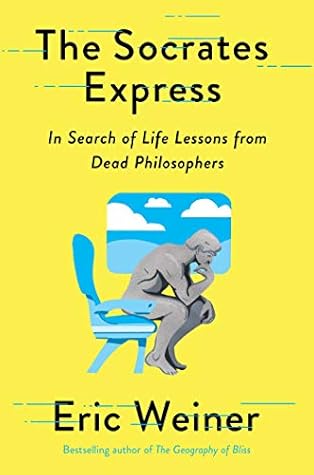More on this book
Community
Kindle Notes & Highlights
by
Eric Weiner
Read between
January 30 - February 24, 2021
Knowledge is something you possess. Wisdom is something you do.
We mistake the urgent for the important, the verbose for the thoughtful, the popular for the good.
Most schools today don’t teach philosophy. They teach about philosophies. They don’t teach students how to philosophize.
As Voltaire said, the best judge of a person is not the answers they give but the questions they ask.
A serious question carries risk, like striking a match in a dark room.
“Our culture has no place where the ultimate questions are honored as questions. Every institution and social form we have is devoted either to solving problems or providing pleasure,”
“A philosopher says to his opinions, ‘You are my opinions. How did you get in here? You didn’t ask me. I didn’t examine you. Yet I believe you. You’re taking over my life.’ ”
Respond to adversity, real or imagined, not with self-pity or hand-wringing, but simply by starting over.
“Who can say what is? He can only say how he sees.”
Not only does who we are determine what we see but what we see determines who we are. As the Vedas say, “What you see, you become.”
Seeing requires not only time but distance, he tells me. “You cannot see anything until you are clear of it.”
Like the bulldog ant, we are author and reader of our own cruelty, victim and perpetrator, fated to consume ourselves, slowly, after suffering for a long time.
“No greater mistake can be made than to imagine that what has been written latest is always the more correct; that what is written later on is an improvement on what was written previously; and that every change means progress.”
Political bonds, Epicurus thought, reduced your self-sufficiency, and amounted to outsourcing your happiness.
“Let nothing be done in your life, which will cause you fear if it becomes known to your neighbor,” said Epicurus.
Take heart, says Epicurus. Nature has you covered. She has made the necessary desires easy to obtain and the unnecessary ones difficult. Apples grow on trees. Teslas don’t.
All inattention is a form of selfishness. We’ve decided that whatever is happening in our heads is more interesting, more important, than what is happening in the rest of the universe. That’s why narcissists are so inattentive. Their attention is bottled up, stagnant. Attention is our lifeblood. It needs to circulate. To hoard attention is to kill it.
“Perhaps no one,” says the writer Stefan Zweig, “has hurled a former life so far from himself as Nietzsche.”
“The whole meaning of the terrible physical suffering to which I was exposed lies in the fact that, thanks to it alone, I was torn away from an estimate of my life-task which was not only false but a hundred times too low.
We must learn, say the Stoics, “to desire what we have.”
Something curious and wonderful happens when we age. We no longer care what others think of us. More precisely, we realize they weren’t thinking of us in the first place.
Best not to think about death, concludes Epicurus. “Death is nothing to us.” You don’t wake every morning worrying about the time before you were born, so why worry about death? You were absent then and you shall be absent again. “When we exist, death is not present, and when death is present, we do not exist.”
We don’t die because we are sick. We die because we are alive.


